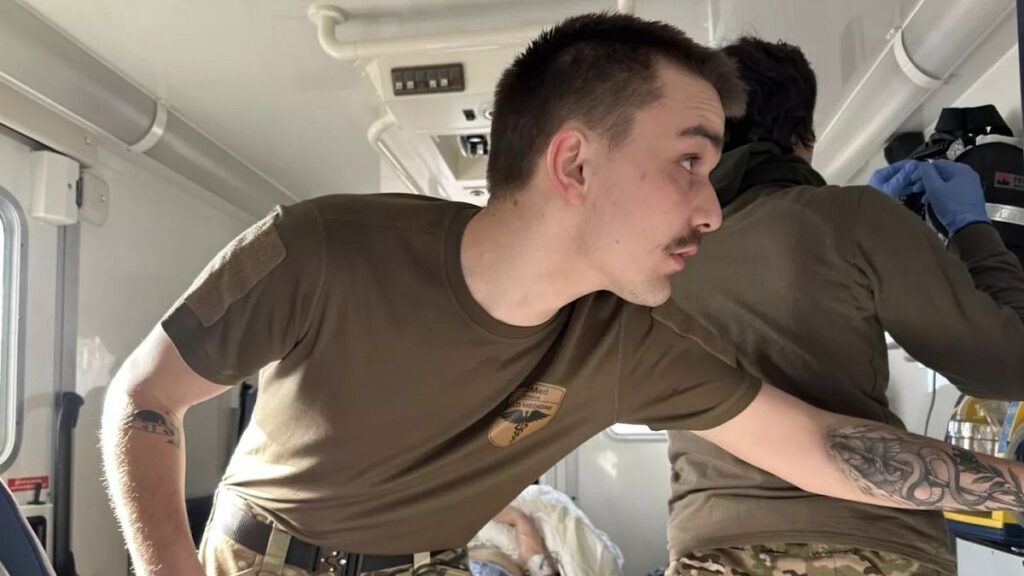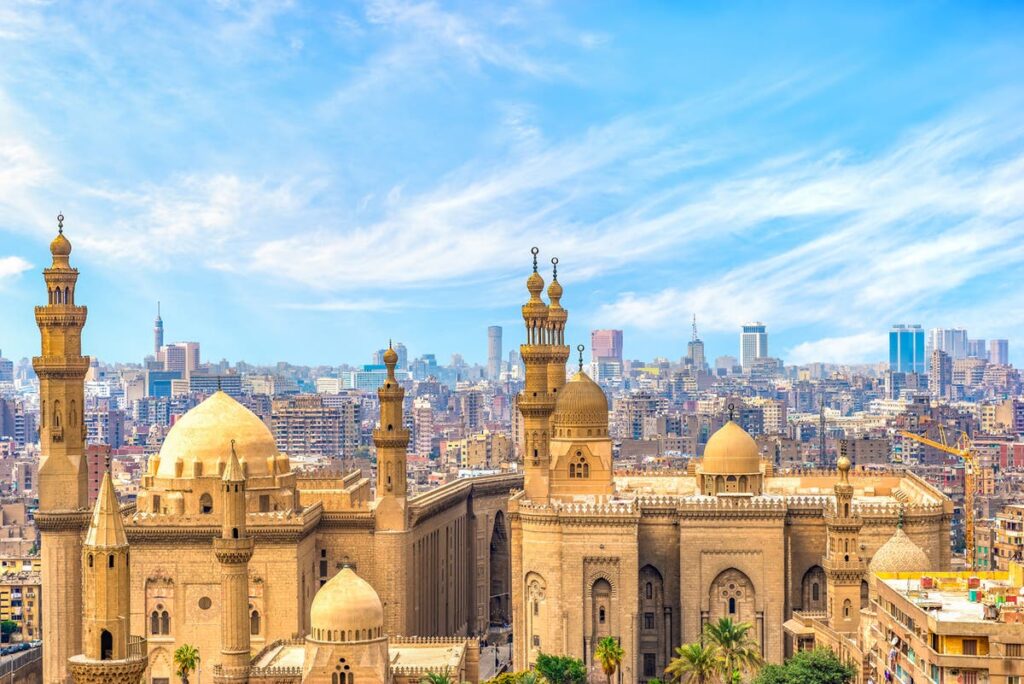Twenty-two-year-old Ruben Mawick had been following Russia’s war against Ukraine even before the full-scale invasion, despite having no personal ties to the country. When Russia launched its full-scale invasion n in February 2022, Ruben wasn’t as shocked as many others.
“I remember seeing the images of missile strikes in Kyiv at five in the morning. People fleeing, Russian tanks crossing the border. That’s when I realised I wanted to go,” Ruben told Euronews.
At the time, however, he wasn’t yet a trained paramedic.
It would be another year before he travelled to Ukraine for the first time. He conducted online interviews with various aid organisations until he found one he felt he could trust.
The then 20-year-old never got cold feet on the long journey from Dortmund to Ukraine. “I was glad I took that step,” Ruben says today. “I think I prepared myself as well as you can when you’ve never experienced war.”
‘As soon as something moves, shoot’
Ruben’s destination was the city of Dnipro, southeast of the capital, Kyiv.
“But the plan changed when the Kakhovka dam was blown up. Instead, I headed south and met up with another team there. After that, I went on my first mission,” he recalled.
“We were quickly spotted by a drone and had to take cover,” says Ruben. The danger was real, and death felt ever-present. The further the group travelled, the louder the impacts became – until they eventually came under fire themselves.
“A checkpoint about 200 metres in front of us was hit,” Ruben remembered. The only alternative route led across mined fields.
“There was no way through without taking a risk. Russian reconnaissance is precise—their drones can spot vehicles from several kilometres away. As soon as something moves, they open fire. Even our markings as an aid vehicle offered no protection,” he said.
To escape unharmed, the group waited for a lull in the shelling. “We counted the strikes and noticed a pattern – not continuous fire, but tactical volleys. When there was a gap of around 30 to 40 seconds, we made our move.”
They heard another impact, followed by brief silence. Ruben took it as a sign that the artillery had been repositioned. “We raced through the checkpoint, just in time. Seconds after we got through, the next shells hit.”
‘Too many people, too loud, no control’
Ruben never intended to stay in Ukraine long-term. His trips typically lasted between three and six weeks. He describes his first return home as “intense”.
“When you leave Ukraine, you notice it straight away: no checkpoints, no one talks about the war, and there’s no sense that something might happen,” said Ruben.
Not long after returning, he attended a shooting festival in Germany and experienced a panic attack.
“Too many people, too loud, no control,” he realised. In Ukraine, large crowds often mean danger – they are frequent targets of Russian attacks.
‘She was born in the middle of the war. She knows nothing else’
Despite everything, it was clear to Ruben that he would return. In the summer of 2023, he set off on his second mission to Ukraine – this time with a new NGO operating in the east of the country.
For the 22-year-old German, it’s difficult to accept that places where he once felt relatively safe are now on the frontline.
“What hits me hardest are the people I met there. Children in villages who were given sweets. Not knowing what’s become of them, that’s what really gets to me.”
He was especially moved by a little girl he met in one of the villages. They didn’t share a language, but sat on the floor together, drawing with chalk.
“I keep seeing this six or seven-year-old girl who flinched every time there was an explosion,” he said, pausing for a moment. “She was born into war. She’s never known anything else.”
The girl gave Ruben a soft toy that he still carries with him. He doesn’t know what became of her. “I tried to find out, but there are so many stories, so many lives affected every day, it’s easy to lose track.”
Ruben couldn’t shake the memory of their encounter. For him, her situation felt fundamentally unjust. “She hadn’t done anything wrong. She was just playing, and still, she had to suffer.”
Stories like hers have only deepened Ruben’s determination to keep helping.
9 September 2023
There’s one day Ruben will never forget: 9 September 2023.
Alongside fellow volunteers Emma, Johan, and Tonko, he set off towards Bakhmut. “We knew the mission was dangerous,” Ruben told Euronews.
Before they left, he asked Tonko if he could sit behind the driver – considered the safest spot in the vehicle. “It was a British car, so the driver sat on the right. Snipers usually aim at the left side.” Tonko told him he could sit wherever he liked.
“The closer we got, the more destruction we saw. It was quiet, we didn’t hear any artillery.” The group was between Bakhmut and Chasiv Yar. Ruben recalls the road being littered with wrecked military vehicles, Humvees and cars, none of them rusted, just freshly destroyed.
“Some still had fresh food in them. I remember a full, uncracked melon—it couldn’t have been there for more than a week,” Ruben said. That was the moment he realised something wasn’t right. But by then, they’d reached the point of no return.
They assessed that Russian FPV drones posed the greatest risk. Their only option was to keep moving. “Stopping or turning around would’ve been even more dangerous. That’s why we kept going.”
Lights off
“And then, almost exactly at 11:30, a Russian anti-tank missile hit the front left of our vehicle.” He didn’t see or hear the missile – or the explosion. Just a beeping sound.
“Suddenly, everything went black. I was sure I was dead. Then I felt metal shards piercing my body.”
His life flashed before his eyes, but he didn’t panic. He was strangely calm. “I thought: I’m only 20. It’s really not cool to die now. But I can’t change it. I have to accept it.”
Then he saw flames and realised that if he wanted to survive, he had to get out of the vehicle. He started crawling, instinctively heading toward the light.
“I could see a bit of sunlight. Not fire, just another light. There was a shattered window, no solid ground to step on, but I managed to squeeze through. My hands stuck to the frame, but I got out,” he recalled.
“Then there was another small deflagration, a fireball. That’s when I finally made it out.” To his own surprise, he was still able to stand. From that moment on, survival mode kicked in.
‘What if the Russians come and take me alive?’
“I just had to function,” said Ruben. “I thought: OK, I’ve got serious burns. It didn’t splatter, but blood was running down my right shoulder. I put my hand in my mouth to feel if my teeth were still there, if my jaw was intact. Everything was numb.”
His right hand was badly burned, his left riddled with shrapnel. “I could barely grip anything.”
He started to assess himself further, but his hands were so bloody he couldn’t tell where the blood was coming from.
Looking in the direction of Bakhmut, a terrifying thought crossed his mind: “What if the Russians come now and take me alive?”
For Ruben, there was only one option in that case: taking his own life.
“I searched for my knife, so I could kill myself if it came to that. Captivity wasn’t an option. I don’t think I’m strong enough for it. I know what they’d do to me, I’m the perfect target for their hatred. You’ve heard the stories: pipe cleaner poisoning, rape. There was no way I was going to let that happen.”
But the knife was gone. If a Russian vehicle had appeared then, Ruben told himself he would run into the surrounding fields, hoping there were still mines that would end it quickly.
But Russian soldiers ever came.
Ruben circled the wreckage and saw Johan trying to pull Tonko out of the vehicle. “Johan had burns on his arms and legs, life-threatening, just like mine,” Ruben remembered. But they had to prioritise what could kill first.
Tonko was in far worse condition. “He had severe burns on his face, serious injuries to his hands, and most of his right leg was gone below the knee.” Ruben knew he had to act fast. Within seconds, he applied a tourniquet.
While treating his friend, Ruben realised his own hands were failing him. “The shrapnel must’ve damaged the nerves. I had this horrible numb sensation, I could barely feel a thing.”
Meanwhile, Johan went looking for Emma, but she was nowhere to be found. Despite the chaos, he remained astonishingly calm. Tonko tried to speak, but Ruben couldn’t make out the words, he was still deafened by the blast.
Then Tonko began crawling into the road. “Right where we’d just been hit,” said Ruben. Panic set in. “The Russians can see us now,” he thought. He shouted for Tonko to come back.
‘Who’s going to come here to save us?’
Tonko’s injuries were so severe that Ruben knew he couldn’t treat them on site. He also understood that Russian forces could attack the group again.
“If they realise there are survivors here, which they did when Tonko crawled onto the road, they’ll keep firing at us. There are no survivors among the Russians. They rarely allow it if they can help it.”
Ruben knew they needed medical help fast, but waiting was not an option. “Who’s going to come here to save us?” he thought.
He decided that he and Johan had to go, both to get help for Tonko and to get away from the immediate danger. With their own injuries, they knew they couldn’t carry him.
The rocket had hit the vehicle from the left, so Ruben and Johan were sure Emma was already dead.
They crawled the first kilometre along the country road, staying in the side ditch. “I remember the grass blades exactly. The tall grass dug into my open wounds. It felt like razor blades.”
Everywhere to the left and right, there were small butterfly mines. After a while, Ruben switched to the road, where the trees grew denser and more cars littered the ditches. “That’s when I realised it was getting harder to breathe.”
He threw off his plate carrier, helmet, and goggles.
“Then the impacts started again,” but with his hearing loss, Ruben couldn’t judge their proximity. Later, a Ukrainian soldier would tell him that the explosions had landed just 50 metres away.
Despite the danger, Ruben and Johan kept moving, keeping their distance from one another. “We stayed apart in case one of us stepped on a mine and only one of us died.”
“I had wild thoughts: What if I die here? How will my family find out?” Ruben reflects today.
After four kilometres, they reached a battlefield. Several water bottles lay abandoned on the ground, some broken. “We grabbed the bottles and drank what we could.”
Their fallen friends were never far from their minds. They later learned that Emma had died instantly, as the rocket had hit so close to her. “For us, a good death is a quick death.”
After a while, Johan and Ruben spotted a Ukrainian vehicle with Ukrainian soldiers. “We were recognised as humanitarian aid workers, and they took us to the supply point where I usually helped.”
Ruben later learned that they had been located by a Ukrainian drone, and a team had been dispatched immediately. He hadn’t noticed the drone at all. “It could have been a Russian drone,” the 22-year-old remarked.
Upon reaching the base, the two were treated right away, but they immediately made it clear that two of their friends were still at the impact site. “I suddenly felt cold. I wasn’t in pain, but I couldn’t feel my hands.”
The thought of leaving someone behind haunted Ruben. He was told a team had been sent immediately, but that Tonko was already dead when they arrived.
The team reached the site around the same time they encountered the Ukrainian soldiers. Ruben believes that if he and Johan had tried to take Tonko with them, they wouldn’t have been able to help him. This realisation helped Ruben accept his friend’s death.
“I was very sorry that he was alone when he died. But if I had stayed there, I would probably have been killed by a Russian drone.”
The first few nights in the hospital were tough for Ruben. Sleeping was difficult because of the burns, and whenever he managed to fall asleep, the nightmares began.
“In my dreams, I saw my friends who were still alive dying. In those dreams, I also had the scars on my leg, which made me think that I had been hit again.”
‘I have to keep going’
After the attack, Ruben left Ukraine for the time being and was taken to his home town of Dortmund, Germany, for treatment.
A month and a half later, Ruben had his first therapy session in Germany.
“I knew something was coming. I wanted to be supported while I was there, rather than waiting until later to find something. It’s not easy to get a therapy spot in Germany.”
He sees the therapy as one of the reasons he doesn’t experience flashbacks of the attack during the day. “I don’t hear any noises during the day, like a drone. I don’t, but I still realise that something happens passively in my head when I hear certain noises.”
What helps him the most is talking about what he has experienced. Ruben has now largely recovered from his injuries. Although the scars are tough, they don’t affect his movement since they’re not over any joints. He still has 40 to 50 pieces of shrapnel in his body. “I still have a piece of bone from Emma in my jaw. That was caused by the trajectory of the missile.”
Despite the injury and the attack, Ruben has returned to Ukraine several times since then to help with rescue missions. He considers his return another significant factor in coming to terms with what he has been through.
Furthermore, “unfortunately, the war isn’t over just because I was injured. I realised that something could happen at any moment. But the deaths of the children there haven’t stopped. I have to carry on.”
For now, Ruben believes he is more useful in Germany by collecting donations for Ukraine. However, he is by no means ruling out the possibility of returning to Ukraine.
Premium IPTV Experience with line4k
Experience the ultimate entertainment with our premium IPTV service. Watch your favorite channels, movies, and sports events in stunning 4K quality. Enjoy seamless streaming with zero buffering and access to over 10,000+ channels worldwide.

















